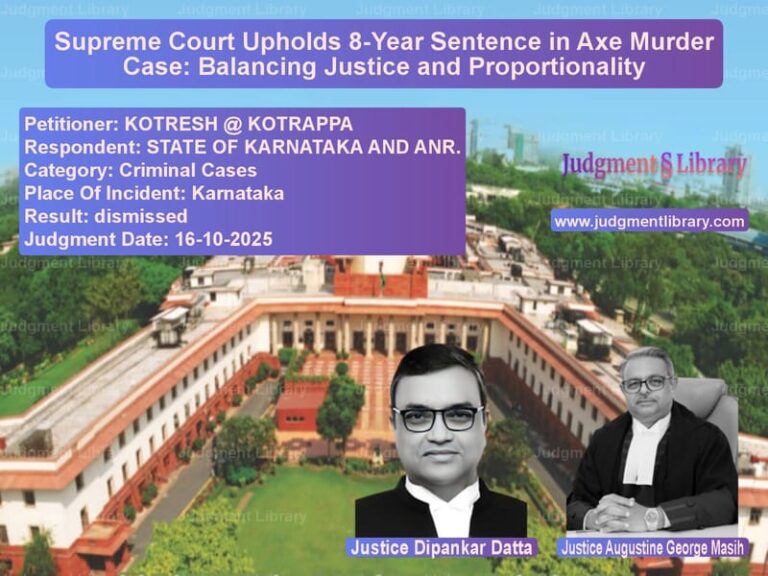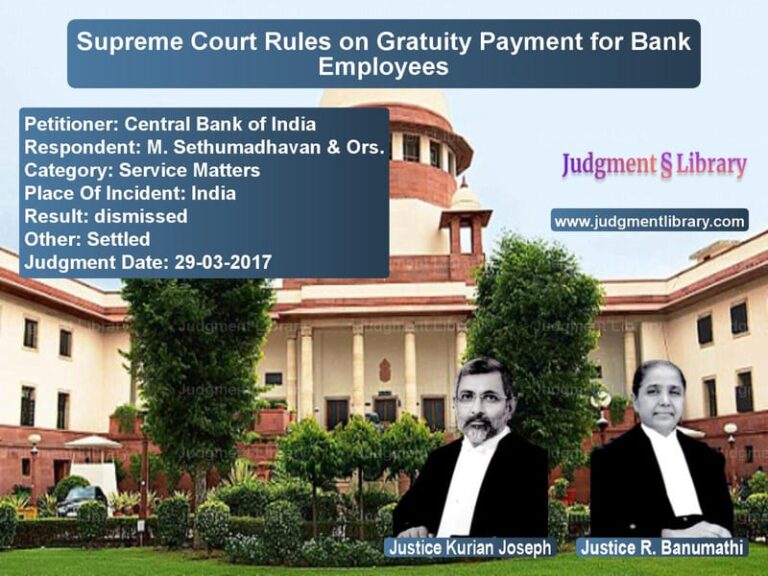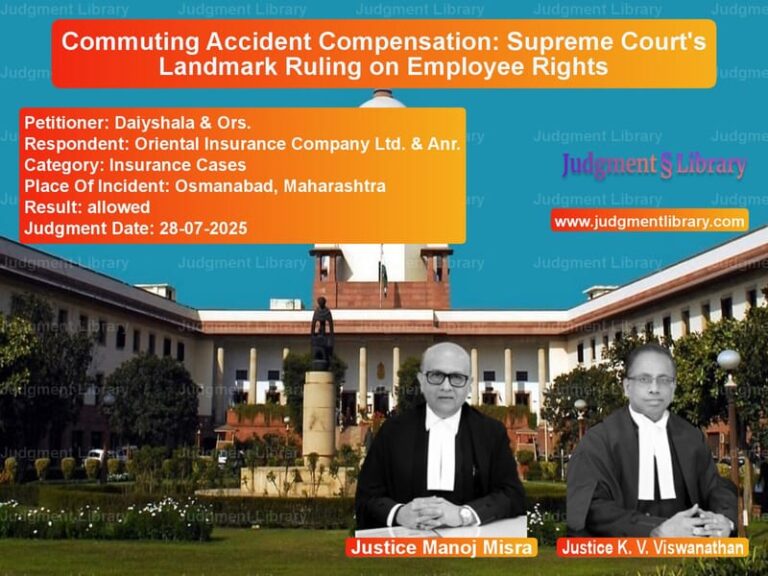Priority of Secured Creditors Over Customs Dues in Liquidation: A Landmark Judgment
The Supreme Court of India, in a landmark ruling, settled a crucial legal dispute regarding the priority of secured creditors over government dues under the Customs Act when a company is undergoing liquidation. The case, Industrial Development Bank of India (IDBI) v. Superintendent of Central Excise and Customs, centered around the question of whether customs authorities could claim priority over secured creditors for the recovery of unpaid customs duties.
This ruling is of immense significance to financial institutions, government agencies, and businesses alike, as it establishes a clear precedence regarding the payment of debts in winding-up proceedings. By analyzing the judgment in depth, this article aims to explain the key arguments of both the petitioner and the respondent, the judicial reasoning, and the impact of this judgment on corporate insolvency laws in India.
Background of the Case
The case arose from a dispute over the liquidation of M/s. Sri Vishnupriya Industries Limited, which had borrowed funds from the appellant, IDBI. As security for these loans, the company had hypothecated its movable properties and created an equitable mortgage of its immovable properties by depositing title deeds. The company had also imported machinery from Italy in 1998-1999, stored in a private bonded warehouse.
However, due to financial distress, the company was unable to clear customs duties amounting to over Rs. 13 crores. As a result, the customs authorities issued multiple show-cause notices and passed adjudication orders demanding payment of the outstanding dues. When the company failed to comply, the customs authorities initiated proceedings to auction the imported goods and recover the unpaid customs duties.
Meanwhile, a winding-up petition was filed before the Andhra Pradesh High Court in 2002. The company was officially ordered to be wound up on December 1, 2003. The Official Liquidator subsequently filed an application requesting the customs authorities to hand over possession of the imported goods, asserting that they fell under the jurisdiction of the winding-up proceedings.
The Single Judge of the High Court ruled in favor of the Official Liquidator, holding that customs authorities did not have the power to auction the goods once the company had entered liquidation. The customs authorities appealed this decision before a Division Bench, which referred the matter to a Full Bench. The Full Bench reversed the Single Judge’s decision and held that customs authorities had the first right to sell the imported goods under the Customs Act, 1962.
Aggrieved by this decision, IDBI, as a secured creditor, challenged the ruling before the Supreme Court.
Arguments Presented
Petitioner’s (IDBI) Arguments:
- The petitioner, IDBI, argued that as a secured creditor, it had a preferential right over the company’s assets in liquidation, as provided under Sections 529A and 530 of the Companies Act, 1956.
- It was contended that Section 529A, a non-obstante provision, grants overriding priority to secured creditors and workmen’s dues over all other debts, including government dues.
- IDBI relied on Supreme Court precedents that established that secured creditors’ claims supersede those of government authorities unless there is a specific first charge created in favor of the government.
- The petitioner argued that the customs authorities did not follow proper procedure under the Customs Act before passing orders for the sale of warehoused goods.
- Since the winding-up order had already been passed, the Official Liquidator had the exclusive right to deal with the company’s assets, and any claims by customs authorities had to be filed before the liquidator.
Respondents’ (Customs Authorities) Arguments:
- The customs authorities contended that under Sections 72 and 142 of the Customs Act, they had an independent right to auction the imported goods to recover unpaid customs duties.
- They argued that the customs duty became due and payable at the time of importation, and since the company had failed to clear the dues, they had the first claim on the goods.
- The respondents relied on the judgment of the Calcutta High Court in Collector of Customs v. Dytron (India) Ltd., which upheld the right of customs authorities to recover dues by auctioning goods even in winding-up proceedings.
- The customs department also contended that they were not “contributories” under Section 468 of the Companies Act and thus were not required to prove their claims before the Official Liquidator.
Supreme Court’s Ruling and Key Observations
The Supreme Court ruled in favor of IDBI, holding that secured creditors had a superior claim over customs authorities under the Companies Act. The Court made the following key observations:
- Section 529A of the Companies Act is a non-obstante provision, meaning it overrides conflicting provisions in other laws, including the Customs Act.
- Under Section 529A, the debts owed to secured creditors and workmen rank pari passu and must be paid in priority over all other debts.
- Section 530 of the Companies Act, which provides preferential treatment to government dues, applies only to taxes ‘due and payable’ within the twelve months preceding the winding-up order. In this case, the customs duties had been due for several years before the winding-up proceedings began.
- The Court held that the customs authorities’ claim did not satisfy the conditions under Section 530(1)(a) of the Companies Act, as the dues had been pending for more than 12 months before the winding-up order.
- The judgment of the Calcutta High Court in Dytron (India) Ltd. was overruled, as it incorrectly prioritized customs dues over secured creditors.
Impact and Significance of the Judgment
This ruling has several far-reaching implications:
- Protecting Secured Creditors: The judgment upholds the rights of secured creditors, ensuring that financial institutions can recover their dues without interference from government authorities.
- Clarification on Government Dues: The ruling sets a precedent that government claims cannot override secured creditors’ rights unless a specific statutory first charge is created.
- Strengthening Insolvency Framework: The Court reinforced the importance of the Companies Act’s priority framework in insolvency cases, ensuring a clear waterfall mechanism for debt repayment.
- Guidance for Future Cases: This ruling provides clarity for future disputes involving conflicts between secured creditors and government agencies.
Conclusion
The Supreme Court’s ruling in Industrial Development Bank of India v. Superintendent of Central Excise and Customs is a landmark judgment that reaffirms the priority of secured creditors in liquidation proceedings. By giving precedence to secured creditors over government dues, the Court has ensured that financial institutions can operate with greater confidence, knowing that their security interests will be protected.
The case also reinforces the necessity for government authorities to comply with the legal framework governing corporate insolvency and liquidation, rather than unilaterally asserting claims over company assets. This judgment serves as an important precedent for future cases involving similar conflicts between secured creditors and statutory authorities.
Petitioner Name: Industrial Development Bank of India.Respondent Name: Superintendent of Central Excise and Customs.Judgment By: Justice Sanjiv Khanna, Justice Sudhanshu Dhulia.Place Of Incident: Andhra Pradesh.Judgment Date: 18-08-2023.
Don’t miss out on the full details! Download the complete judgment in PDF format below and gain valuable insights instantly!
Download Judgment: industrial-developme-vs-superintendent-of-ce-supreme-court-of-india-judgment-dated-18-08-2023.pdf
Directly Download Judgment: Directly download this Judgment
See all petitions in Company Law
See all petitions in Bankruptcy and Insolvency
See all petitions in Corporate Compliance
See all petitions in Judgment by Sanjiv Khanna
See all petitions in Judgment by Sudhanshu Dhulia
See all petitions in allowed
See all petitions in supreme court of India judgments August 2023
See all petitions in 2023 judgments
See all posts in Corporate and Commercial Cases Category
See all allowed petitions in Corporate and Commercial Cases Category
See all Dismissed petitions in Corporate and Commercial Cases Category
See all partially allowed petitions in Corporate and Commercial Cases Category







